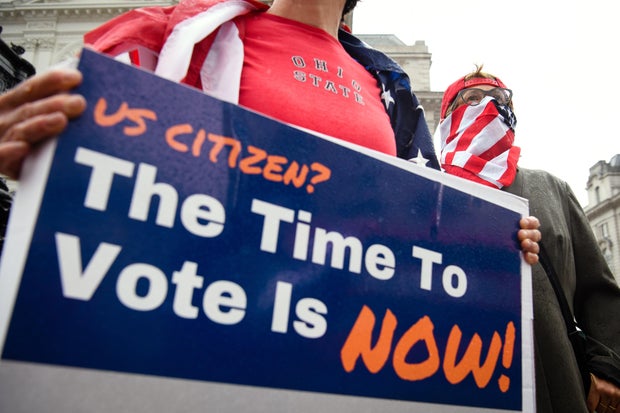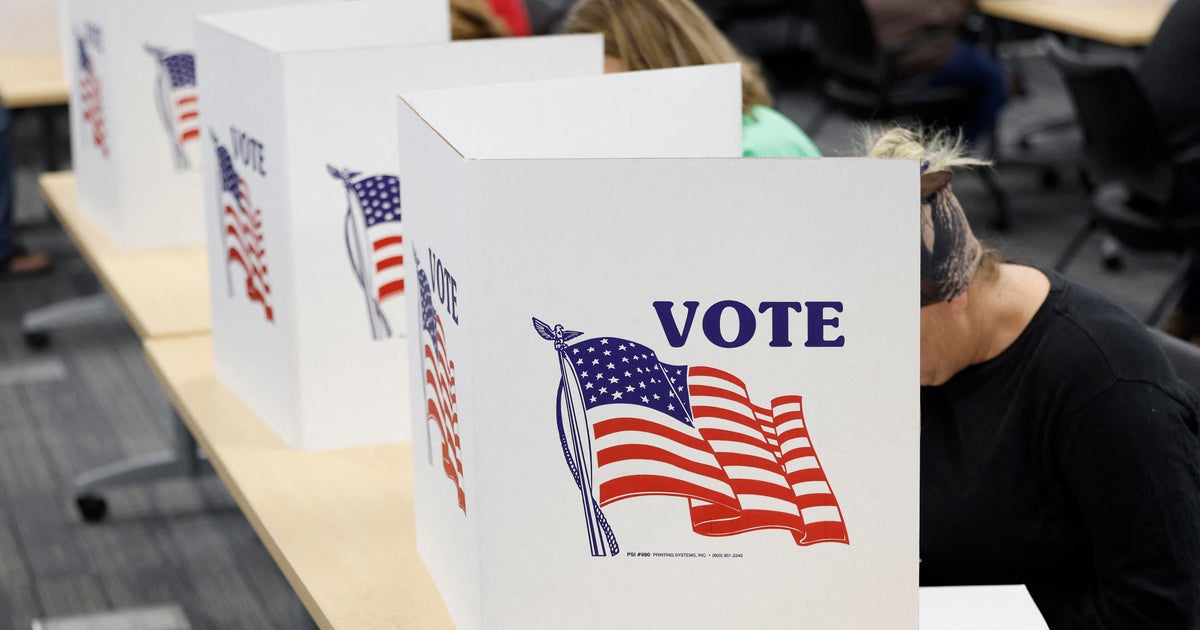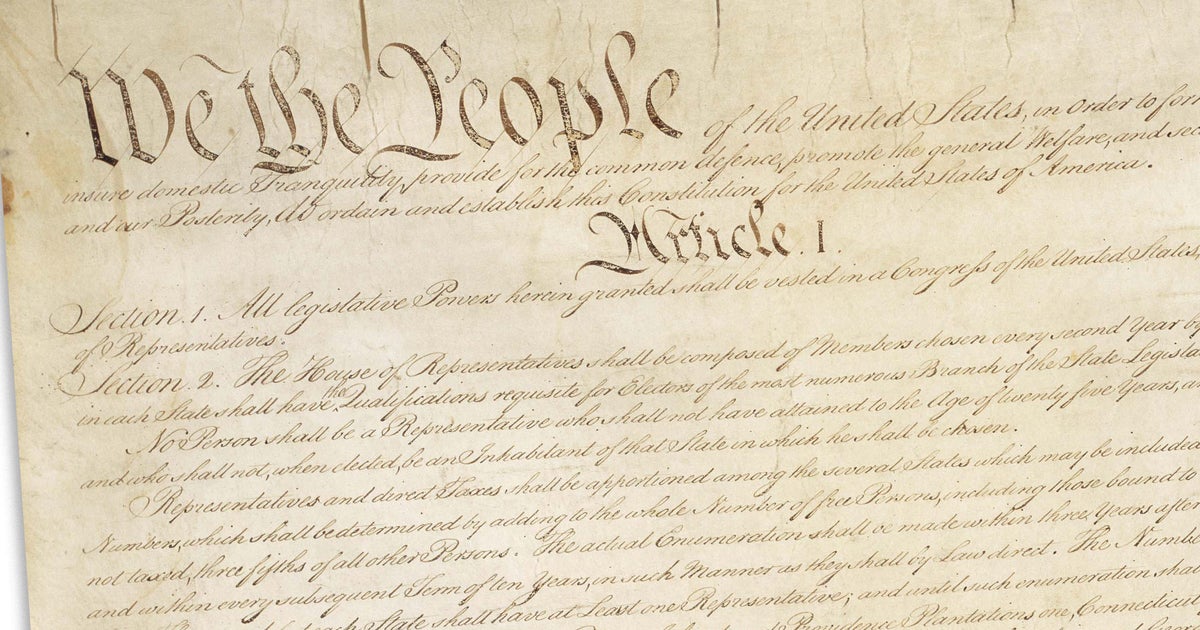CBS News
Democrats to invest six figures in turning out voters living outside the U.S.

The Democratic Party is making a first-time investment in registering and turning out voters living outside of the United States. The party is estimating that some 1.6 million Americans abroad are from crucial battleground states this cycle.
According to details first shared with CBS News, the Democratic National Committee is investing $300,000 to reach voters outside the country — military and non-military. The investment, which the DNC says is its first in a presidential cycle, is meant to help “Democrats Abroad,” the main Democratic group in charge of registering and assisting non-military voters outside the U.S. with their mail-in ballots.
Non-military American voters who live outside the U.S. include those out of the country for business, students spending a semester abroad and “digital nomads” who are able to work remotely wherever they want.
While experts and operatives say the transient nature of voting-age ex-pats makes it difficult to track, the latest government data from the 2020 presidential election found that 2 million are either on active duty or are military spouses and dependents and that 2.9 million are non-military voting-age U.S. citizens. Of the nearly 5 million voting-age residents and military living abroad, 1.25 million registered to vote in 2020, according to an Election Administration and Voting survey.
Paul Zinken/picture alliance via Getty Images
But the DNC believes that this cycle, more than 1.62 million voters abroad are from the battleground states of Arizona, Georgia, Michigan, Nevada, North Carolina, Pennsylvania, and Wisconsin.
While military voters turned out at 47% in 2020, only 8% of non-military voters living outside cast a ballot in the race between President Biden and former President Donald Trump. Non-military turnout in the 2022 Congressional midterms was even lower at 3.4%, according to the Federal Voting Assistance Program.
But Democrats point to heightened interest in Vice President Kamala Harris’ candidacy, and say their effort is to leave no stone unturned.
“This election will be won on the margins, and every single vote counts,” said DNC Executive Director Sam Cornale. “Democrats are leaving nothing to chance, investing heavily with our abroad party to ensure every single U.S. citizen has a voice in this election.”
Martha McDevitt-Pugh, the chair of Democrats Abroad, said that since Mr. Biden withdrew his candidacy on July 21, there’s been a 100% increase in Americans abroad registering to vote and requesting their ballot through their votefrombroad.org website.
“Joe Biden made us feel a little bit disconnected,” said Peter Scardino, a 25-year-old Democrat living in the U.K. “[Harris] is definitely a lot more of an inspiring candidate. I definitely think that we feel that across the pond with the news that we get.”
McDevitt-Pugh added that political leanings vary from country to country, but they tend to lean Democratic for most. One GOP group formed in 2013, Republican Overseas, directs abroad citizens looking to register to the non-partisan Federal Voting Assistance Program.
Abroad absentee ballots have been decisive in past elections.
When the 2022 Pennsylvania Republican Senate primary was heading towards a recount, state election officials cited roughly 6,000 outstanding absentee ballots – including military and overseas ballots – that were still being counted. Republican Dr. Mehmet Oz was declared the winner by just 951 votes.
Half of the ballots requested in 2020 from American non-military voters were returned back to battleground states, according to Democrats Abroad. And the abroad ballots counted in Arizona (18,483) and Georgia (18,867) were more than Mr. Biden’s margin of victory, according to a 2020 analysis by the Electoral Assistance Commission.
LEON NEAL / Getty Images
According to the Federal Voting Assistance Program, most adult U.S. citizens abroad reside in Canada, followed by the United Kingdom, France and Israel.
The technical aspect of returning ballots varies from state to state. But overseas citizens primarily used email, while uniformed services voters commonly send their ballots back by mail, according to a review by the Election Administration and Voting survey.
Having an infrastructure in place to educate voters on how and when to cast their vote is crucial, said McDeVitt-Pugh, who lives in the Netherlands but is registered to vote in California.
She notes these voters are often shifting, moving from place to place, so each cycle Democrats Abroad focuses on finding newer voters through their organizations on the ground in 190 countries.
In 2020, about 40% of states required overseas ballots to be received by election day, while 60% had deadlines after election day but had to be postmarked by then.
She said multiple battleground states – Georgia, Michigan, Pennsylvania and Wisconsin – require ballots to be sent back via mail, which can make it challenging in countries without “a well-functioning postal system.”
“You need to really get that ballot in early,” McDeVitt-Pugh said, adding that most absentee abroad ballots are sent by Sept. 21, 45 days before election day. “One of the big issues with Americans abroad is they wait too late.”
McDevitt-Pugh said the low turnout for U.S. citizens abroad is mainly because “people abroad don’t know they can vote… that they retain that right to vote.”
She added the DNC’s investment can help them with digital outreach in areas with lots of American citizens, such as Canada which has a large number of registered voters in Michigan and Ohio.
“There’s a whole variety of reasons people are living abroad. It’s really great to have recognition – this is an important constituency,” she added.
The right for overseas ballots to be counted by every state is protected under the Uniformed and Overseas Citizens Absentee Voting Act (UOCAVA), passed in 1967.
CBS News
How Donald Trump and Kamala Harris could reach 270 electoral votes

Watch CBS News
Be the first to know
Get browser notifications for breaking news, live events, and exclusive reporting.
CBS News
Republican Rep. Elise Stefanik on Election Day issues, Trump’s potential return to office
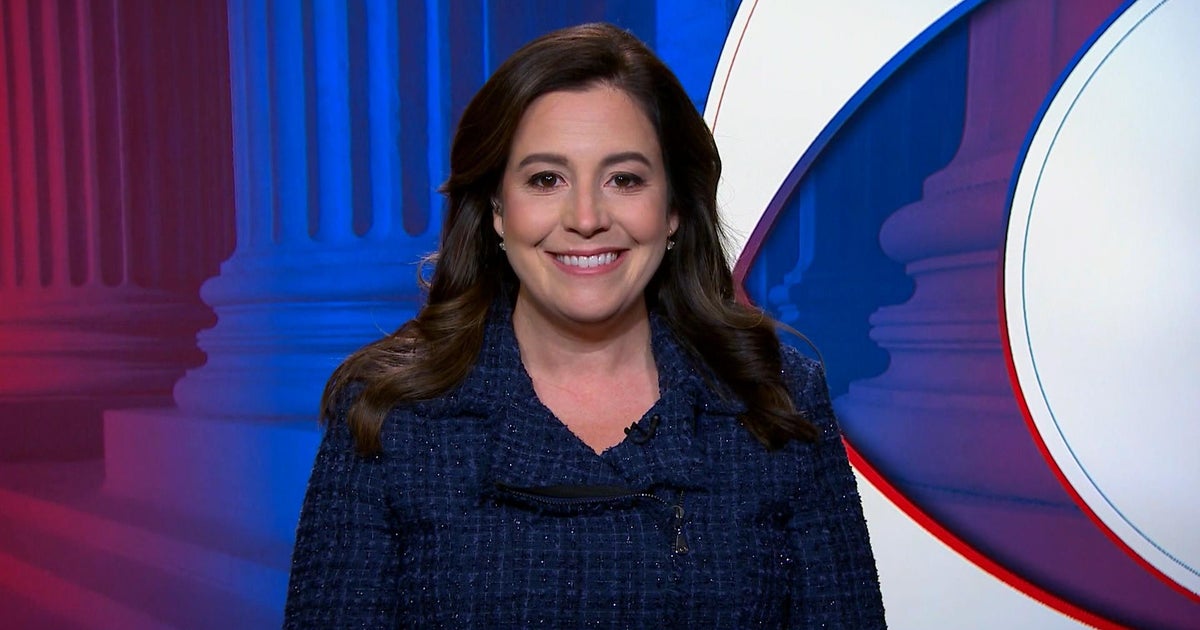
Watch CBS News
Be the first to know
Get browser notifications for breaking news, live events, and exclusive reporting.
CBS News
When will we know the presidential election results? A state-by-state guide
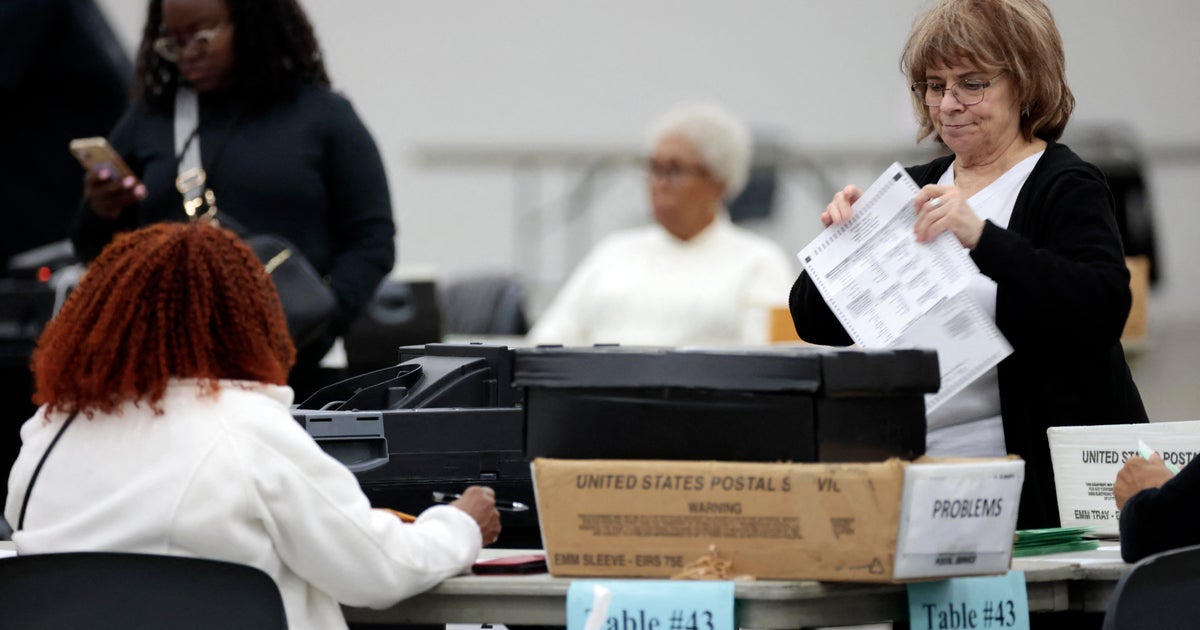
Waves of election results will begin coming in Tuesday night after polls close throughout the country, but in many key states it may take a while to know who has won — and much longer to get official, certified results.
There are a number of reasons it can take longer for ballots to be counted in some states, including the rise of mail-in voting, an option taken by nearly one-third of voters nationwide during the 2022 midterm elections, according to the MIT Election Lab. Some states allow mail-in ballots to be counted before Election Day, while others do not allow poll workers to start counting those ballots until in-person voting has come to an end.
CBS News considers seven states to be battleground states in the 2024 presidential election. Here’s a breakdown of those states’ rules around official ballot counts and certification.
Arizona
Polls close in Arizona at 7 p.m. local time (9 p.m. ET).
Arizona has allowed voting by mail for over two decades, and approximately 80% of voters in the state vote by mail. Ballot processing and tallying in the state can begin when the ballots are received by election workers, but results may not be released before all precincts have reported or one hour after the polls close on Election Day, whichever is sooner. Releasing information earlier is a felony in Arizona.
University of Arizona professor Christopher Weber, who leads the Arizona Voter Project, said it could be nearly two weeks before every vote is tallied in the state’s most populous county.
“The polls are really close in Arizona, and Maricopa [County] is expecting 10 to 13 days to count all votes,” Weber said. “I – like others – anticipate delays. Though we may have predictions beforehand, it’s really difficult to say. I don’t remember a time in which polling was so close.”
County elections officials are responsible for the counting of ballots in federal, state and county elections, according to the state elections website. Early and provisional ballots first undergo signature verification at a county recorder’s office, and counties can begin tabulating votes once early voting has begun. Most early ballots will be counted before Election Day, while those that are received on Election Day will be tabulated in the days immediately afterward.
An automatic recount is triggered if the margin of the votes between two candidates is 0.5 percentage points or fewer. Recounts may not be requested in Arizona.
Since 2020, the state has been the epicenter of a campaign among Trump supporters to undermine trust in the nation’s election systems, leading elections officials in the state’s largest county to erect a veritable fortress to defend the center where votes are counted.
Georgia
Polls close in Georgia at 7 p.m. ET.
Absentee ballot voting in Georgia plummeted after the 2020 election, when more than 1.3 million residents availed themselves of that option. During the 2022 midterm elections, that figure was below 300,000, a figure advocates blamed on a controversial 2021 law that reduced access to ballot drop boxes, increased restrictions on mailed ballots and introduced other rules like banning food and drink distribution to voters in line by non-poll workers.
That legislation was among a string of changes implemented in the last four years by the state’s Republican-dominated government. In September, Georgia’s State Election Board approved a requirement that ballots be counted by hand after machines tally the votes. But that and other recently adopted rules were blocked by Georgia judges who concluded they were adopted too close to Election Day.
Emory University professor Andra Gillespie said if the race is close, once again it may take time for it to become clear who’s won.
“In general, I want to prepare people for the possibility that it may take a couple of days to count, and just because it may take a couple of days, that doesn’t mean people are manipulating the system,” Gillespie said.
Georgia law requires that the vote be certified “not later than 5:00 P.M. on the Monday following” the election, but since this year that Monday falls on Nov. 11, Veteran’s Day, that deadline has been moved to the following day, Tuesday, Nov. 12.
The deadline for either candidate to request a recount is two days later, Thursday, Nov. 14. In Georgia, a losing candidate may petition for a recount when results are within 0.5% of total votes cast for the office.
Michigan
The last polls close in Michigan at 9 p.m. ET. (While polling places in much of the state are in the eastern time zone and close at 8 p.m., some western counties are on central time.)
About 42% of Michigan voters in 2022, 1.9 million, cast absentee ballots, down from 59% in the 2020 presidential election, according to local news site MLive.com.
Oakland University professor David Dulio said it can be hard to predict when the state’s winner will be apparent, because “elections in Michigan are very decentralized.”
“Our elections are run by 1,600 different local clerks who all have to do all of that work and then send it up the chain. That has the potential to slow things down,” Dulio said. He added that the state’s largest city, Detroit, “is notoriously slow,” and its third largest city, Warren, will not be taking advantage of a relatively new state law allowing clerks to pre-process absentee ballots up to eight days before Election Day.
County boards of canvassers have up to 14 days after the election to complete their official counts, which are then turned over to a state board. The Secretary of the Board of State Canvassers must announce a winner by Nov. 25.
In the event of a close race — with the two candidates separated by fewer than 25,000 votes — Michigan law encourages the state board to expedite its canvass “as soon as practicable.”
If the candidates are within 2,000 votes, an automatic recount is triggered, but it must be completed within 30 days of the election.
Nevada
Polls close in Nevada at 7 p.m. PT (10 p.m. ET).
Beginning in 2022, Nevada became one of eight states to conduct all-mail elections, in which every citizen is delivered a vote-by-mail ballot with a pre-paid postage, though in-person voting at polling locations is also allowed.
The state’s board of county commissioners is required to complete county-level canvasses by Nov. 15, which is 10 days after the election.
Sondra Cosgrove, a professor at the College of Southern Nevada who runs the nonprofit Vote Nevada, said it shouldn’t take quite that long to know who’s won.
“We are assuming we will know by November 9,” Cosgrove said.
Either candidate can demand a recount by Nov. 18, and that recount must begin within a day and be completed within five days, Nov. 24 at the latest. That’s because on the fourth Tuesday of the month — Nov. 26 — the secretary of state is required to meet with Nevada’s Supreme Court justices to conduct a statewide canvass. The governor then certifies the election.
North Carolina
Polls close in North Carolina at 7:30 p.m. ET.
This year, both turnout and ballot processing could be impacted by the destruction of Hurricane Helene. The storm wreaked havoc across wide swaths of the western half of the state in late September, displacing residents and destroying infrastructure, including polling locations.
The North Carolina State Board of Elections approved emergency measures on Oct. 7 with the goal of improving access to voting for residents of 13 counties affected by the storm.
County election boards are required by state law in North Carolina to meet at 11 a.m. on Nov. 15 to complete their canvases. The State Board of Elections is required to meet on the Tuesday three weeks after the election, Nov. 26. If there are no protests to the results, that board must issue a certification of the election six days later.
A mandatory recount is triggered if the two candidates are separated by less than half a percent, and one of the candidates formally requests to have the votes counted again. That request must be made by noon on Nov. 17, two days after the county-level canvass.
Pennsylvania
Polls close in Pennsylvania at 8 p.m. ET.
Under Pennsylvania law, counties cannot begin counting mail-in and absentee ballots until 7 a.m. on Election Day. In 2020, that was the beginning of a laborious process to log more than 2.7 million votes returned by mail. Full returns are processed beginning at 9 a.m. on the third day after the election, or Nov. 8 this year.
The state, viewed by many as a crucial must-win for both candidates, was beset by lawsuits in 2020 — most of which were dismissed or dropped — as Trump and his allies sought to stymie Mr. Biden’s growing lead in the hours and days after polls closed and ballots were counted.
This year, Pennsylvania’s Supreme Court in August issued an order expediting election-related cases. The order shortened the window in which a lower court decision can be appealed, from 10 days to three.
University of Pennsylvania professor Marc Meredith said the vast majority of ballots will be counted relatively quickly.
“We’ll get our first vote reports from many counties quite quickly after polls close. These will often be all of the mail ballots that people were able to get through by then,” Meredith said. “Nearly all Election Day votes should mostly be reported by early Wednesday morning.”
But if the race is as close as expected, it could hinge on votes that are slower to tally.
“Provisional ballots typically are reported out in smaller counties on Thursday through Monday in the larger counties,” Meredith said.
A recount and recanvass is automatically triggered in the state if the unofficial election returns, due by Nov. 12, show the candidates separated by less than 0.5%. The recount would be required to be completed by Nov. 26.
Wisconsin
Polls close in Wisconsin at 8 p.m. CT (9 p.m. ET).
Barry Burden, Director of the University of Wisconsin’s Elections Research Center, said, “typically 2 to 2 ½ hours after polls close, we start to get a pretty good picture of the state,” but he noted Milwaukee takes longer.
“It’s the biggest city, and it has the most ballots, and it also counts absentee ballots at a central location,” Burden said. “That’ll be after midnight, 1 (a.m.) or 2 a.m.”
Most town and city clerks in Wisconsin are required to deliver tallies to their county clerks by 4 p.m. the day after the election, or by 4 p.m. the following day if the municipality uses a municipal board of absentee ballot canvassers to canvass absentee ballots.
And a county board of canvassers has until Nov. 19 to deliver certified vote statements to the Wisconsin Elections Commission. The chair of that commission is required to certify the election by Dec. 1, according to state law.
After the final county is delivered its results to the commission, a candidate can seek a recount if the race is within 1%.
When polls close in other states
(All times local)
- Alabama: 7 p.m.
- Alaska: 8 p.m.
- Arkansas: 7:30 p.m.
- California: 8 p.m.
- Colorado: 7 p.m.
- Connecticut: 8 p.m.
- Delaware: 8 p.m.
- District of Columbia: 8 p.m.
- Florida: 7 p.m.
- Hawaii: 7 p.m.
- Idaho: 8 p.m.
- Illinois: 7 p.m.
- Indiana: 6 p.m.
- Iowa: 8 p.m.
- Kansas: 7 p.m.
- Kentucky: 6 p.m.
- Louisiana: 8 p.m.
- Maine: 8 p.m.
- Maryland: 8 p.m.
- Massachusetts: 8 p.m.
- Minnesota: 8 p.m.
- Mississippi: 7 p.m.
- Missouri: 7 p.m.
- Montana: 8 p.m.
- New Hampshire: 7 p.m., though local municipalities are allowed to stay open later.
- New Jersey: 8 p.m.
- New Mexico: 7 p.m.
- New York: 9 p.m.
- North Dakota: Between 7 p.m. and 9 p.m. depending on location.
- Ohio: 7:30 p.m.
- Oklahoma: 7 p.m.
- Oregon: 8 p.m.
- Rhode Island: 8 p.m.
- South Carolina: 7 p.m.
- South Dakota: 7 p.m.
- Tennessee: 8 p.m. ET, 7 p.m. CT.
- Texas: 7 p.m.
- Utah: 8 p.m.
- Vermont: 7 p.m.
- Virginia: 7 p.m.
- Washington: 8 p.m.
- West Virginia: 7:30 p.m.
- Wyoming: 7 p.m.



